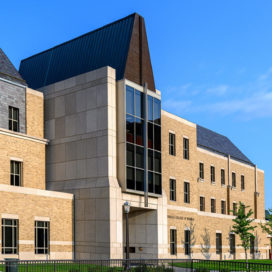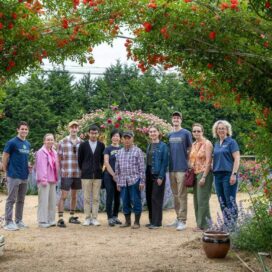From Music to MBA: IV with a Notre Dame Mendoza Student
Published: January 10, 2014 / Author: Mendoza College
Note: This interview originally was published on Accepted.com.
Here’s a talk with Notre Dame Mendoza student,
Jessica Bonanno, a second-year student with lots of advice to share about life
at Mendoza – competitions, courses, and culture. Of particular interest to ND
applicants will be Jessica’s application tips and her definition of the ideal
Mendoza student. Thank you Jessica and best of luck to you!
This interview is the
latest in an Accepted.com blog series featuring interviews with
current MBA students, offering readers a behind-the-scenes look at top MBA programs. We hope
to offer you a candid picture of student life, and what you should consider as
you prepare your MBA application.
Accepted: We’d like to
get to know you! Where are you from? Where and what did you study as an
undergraduate? What’s your favorite non-school book?
Jessica: I grew up in Central Florida and got my
degree from a small liberal arts school called Rollins College, where I studied
classical piano and music education. During my senior year, I started a small
music program for kids which became very successful in its mission and was my
full time job for about eleven years, until I decided to apply to
b-schools.
Accepted: Can you talk
more about your involvement with music? Is there a connection between your work
as a musician and an educator and your MBA?
Jessica: I always think it’s funny when folks ask me
how I went from music to business because it’s much more typical, indeed
clichéd, for folks working in the corporate world to feel mismatched and dream
of being an artist or a musician. But I am the opposite: I was a total Type-A
hiding out in the world of fine arts.
Yes, I majored in
music and went on to found an after-school music program. Yes, I ran a
non-profit trade association for music teachers and I even managed a rock band.
But, all along, I knew deep down that I wasn’t truly a musician on the inside.
Music was just something I knew, which became a conduit for me to serve others
and express my creativity. The reason my initiatives succeeded was less about
my musical knowledge and much more about my entrepreneurial nature and
inclination toward designing efficient systems to support innovative ideas or
worthy missions.
It took me many years
to realize this but, when I finally did, I knew getting an MBA would help
me take my natural organizational development talent to the next level and give
me some hard skills to back up my leadership ability.
Accepted: Why did you
choose Notre Dame Mendoza?How
would you say you’re a good fit with the program?
Jessica:Notre Dame was the very
first program I ever looked at, after deciding to apply to business school.
Coming from mission-driven organizations, I had a lot of apprehension about
applying to business school. I knew my interest in social enterprise would not
be the norm in any b-school but, at a minimum, I wanted to find a program that
supported a critical examination of the role of business in society and
promoted discussions about the intersection of business and ethics.
Notre Dame was that
program.
This doesn’t mean that
everyone here is interested in social business, like me. To the contrary – only
about a fifth of my class plans to pursue this type of a career. But even if
everyone isn’t interested in an expressly social career, nearly everyone in the
program is interested in expressing their own personal values in their career
choices. And though this means different things for different people and we
sometimes disagree among ourselves, you’ll never find anyone here who would
argue that it’s ok to succeed in business at the expense of others. I expected
to find an overemphasis on profit at any cost at b-school but, instead I have
found that nearly every MBA topic at ND is examined through an ethical lens.
The curriculum is refreshingly holistic.
Accepted: What have
been some of your favorite classes so far at ND?
Jessica: I set two personal goals for my MBA
experience: First, I wanted to become really, really knowledgeable and skilled
in the areas that I already knew something about, such as organizational
leadership and social business. Second, I wanted to learn a brand new area that
I knew absolutely nothing about, so I selected finance and investments.
On the social side,
I’ve been privileged to take courses like Entrepreneurship in Developing Countries,
which is coordinated through our Gigot Center for Entrepreneurship (a fantastic
resource for aspiring entrepreneurs and social entrepreneurs alike). This
spring, I’ll be participating in one of our program’s signature courses called Business
on the Frontlines, in which students work as real-world consultants for
businesses in post-conflict regions or developing economies. My team will be
traveling to Guatemala to work with an agricultural cooperative.
On the finance
side, I’ve been able to study topics like M&A and International Finance
under expert practitioners and, this spring, am looking forward to
participating in the elite Applied Investment Management (AIM) program, in which
my team and I will be responsible for managing a portion of our school’s
endowment.
Other highlights of my
time at Mendoza include studying for 8 weeks in Santiago, Chile, writing an
original case study (pending publication) for the Fanning Center for Business
Communications, and competing for thousands of dollars in start-up capital in
the McKloskey Business Plan competition.
But none of this
compares to the sense of community. The people are what make Notre Dame
special. Here’s a blog post I wrote about what it’s like to be a student in
such a close-knit and amazing community.
Accepted: Can you tell
us about your competition experience – both with the ND Deloitte Interterm Case
Competition and the BYU Social Innovation Case Competition?
Jessica: You’ve probably heard that case competitions
are considered the varsity sport of b-school. They’re a chance to consolidate
the sum of your professional experience and business training to solve a real
business problem in a short time, while competing against other very talented
people to create the best solution.
I’ve had the pleasure
of competing in three case comps and they’ve been some of the most fun I’ve had
during my MBA. Most case comps are time constrained, requiring a full solution
to a challenging case in under 5 days. The process is extremely intense and
involves a lot of all-nighters and last-minute preparation, which can stress
out a team that doesn’t have a commitment to humility, cooperation and
kindness. But the amount that can be accomplished in this time is astounding,
when you have a group of diverse, brilliant students with a do-or-die work
ethic and an attitude of good sportsmanship, the signature trait of a Notre
Dame MBA.
My teams took first
place in two of the three case comps I’ve participated in, which made the fun
of competition all the more rewarding. The Deloitte Interterm Case Competition
is actually a part of the first-year curriculum – all students participate and
we compete among other Notre Dame MBAs. The BYU Social Innovation Case Comp is
an annual competition sponsored by BYU’s Ballard Center for Economic Self-Reliance.
Notre Dame actually sponsored our team and flew us out to Utah, where we had
the privilege of meeting some amazing MBAs from other schools. As part of the
festivities, we even got to participate in an all-day TED-X event.
Accepted: What has your
involvement with the Forte Foundation been like? Would you recommend the
program to other b-school-bound women?
Jessica: I’m very supportive of Forte’s mission to
bring more women into business leadership. However, the companies that they
work with, many of which are large banks, aren’t necessarily a match for my own
interests so I haven’t become too involved with the foundation. Regardless, I
think they’ve created an amazing resource for women who are seeking more
traditional business careers, which is a positive thing for women as well as
for society, in general. Research shows that women business leaders tend to
take less unnecessary risks and are much more concerned with the role of
business in society…And the world needs more of that.
Accepted: Where do you
see yourself in five years from now?
Jessica: My professional interests include a variety
of social business topics including cooperatives, social enterprise, and impact
investing. But I’m seeking a career in the socially responsible investment space
because my background in non-profit and education taught me that that’s where
the greatest need is. There are plenty of brilliant people with brilliant ideas
in the social space but there is a shortage of socially-oriented professionals
who understand how to raise capital, create sustainable revenue models, or
maximize a shoestring budget. That’s the value I hope to provide, perhaps as
the manager of an impact fund.
Accepted: What are
your three top tips for ND Mendoza applicants?
Jessica: 1. In my observations, Notre Dame is looking
for mature, honest candidates who have a record of accomplishment,
a strong work ethic, and a balanced lifestyle. This community encourages excellence
not only in academics and professional background, but also excellence of body,
mind, spirit, and citizenship. Make sure that your essays and interview
answers reflect the things about you that demonstrate this. Talk about your
accomplishments and your values. Talk about your ambition and your family or
community. Most importantly, don’t act entitled. Humility is the hallmark of
the type of servant-leader that Notre Dame is looking for.
2. Notre Dame wants
you to want them. Our program has chosen to remain small to preserve the type
of close-knit community that makes us unique. For that reason, admissions
officers will be impressed by candidates who can clearly articulate why they
think they are a match for ND. So, find out by reaching out to current students
or scheduling a campus visit. Most people don’t truly understand and can’t
explain what makes Notre Dame so special until they’ve been there or interacted
with the people. Once they have, they can craft a much more convincing argument
for why they belong at ND.
3. Take advantage of
all application rounds. Unlike some top schools, who fill most
of their class in rounds one and two and have few seats left open in spring,
Notre Dame admits a good number of candidates in every round. So, if it’s late
in the year and you’re trying to decide whether to apply or wait for fall, go
ahead and do it! As long as you have a strong application, your chances will
still be good even late in the year.
Accepted: Last but not
least, who would you say is the ideal ND student?
Jessica: I would suggest that Notre Dame’s MBA program
is a good fit for anyone who has good qualifications but who is also interested
in:
• a traditional
business career (finance, consulting, etc) but who wishes to express either
personal or religious values in their career; or
• social
enterprise or an impact career; or
• entrepreneurship
generally; or
• the emerging
field of business analytics (we just developed a concentration in this field);
or
• Business
Communications (our Fanning Center for Communications is very well-known).
ND is also very
military friendly and is good for anyone who is married or has a family (the
grad school is extremely supportive of young families and couples and has many
resources, activities, and housing options available).
For one-on-one
guidance on your b-school application, please see our MBA Application Packages. For specific advice on how to create
the best application for Notre Dame Mendoza, seeNotre Dame Mendoza 2014 MBA Application Questions, Deadlines, Tips.
–
See more at:
http://blog.accepted.com/2014/01/10/from-music-to-mba-iv-with-a-notre-dame-mendoza-student/?utm_source=twitter&utm_medium=social&utm_content=4327619#sthash.AmsQk4Ma.dpuf
/news_and_events/news_articles/article/14091/from-music-to-mba-iv-with-a-notre-dame-mendoza-student
Related Stories




